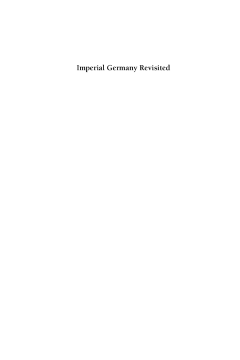
Additional Information
Book Details
Abstract
The German Empire, its structure, its dynamic development between 1871 and 1918, and its legacy, have been the focus of lively international debate that is showing signs of further intensification as we approach the centenary of the outbreak of World War I. Based on recent work and scholarly arguments about continuities and discontinuities in modern German history from Bismarck to Hitler, well-known experts broadly explore four themes: the positioning of the Bismarckian Empire in the course of German history; the relationships between society, politics and culture in a period of momentous transformations; the escalation of military violence in Germany's colonies before 1914 and later in two world wars; and finally the situation of Germany within the international system as a major political and economic player. The perspectives presented in this volume have already stimulated further argument and will be of interest to anyone looking for orientation in this field of research.
Cornelius Torp is Lecturer at Martin Luther University of Halle-Wittenberg, Department of History and is currently Research Fellow at the Freiburg Institute for Advanced Studies. His publications include Die Herausforderung der Globalisierung. Wirtschaft und Politik in Deutschland 1860-1914 (Vandenhoeck & Ruprecht 2005). He is joint editor of European Review of History.
Sven Oliver Müller is a Research Group Leader at the Max Planck Institute for Human Development, Berlin. His recent publications include Die Oper im Wandel der Gesellschaft: Kulturtransfers und Netzwerke des Musiktheaters im modernen Europa (Oldenbourg 2010; with Ther, Toelle, and Zur Nieden) and Deutsche Soldaten und ihre Feinde: Nationalismus an Front und Heimatfront im Zweiten Weltkrieg (Fischer 2007).
“…an excellent set of 21 essays from well-established and emerging scholars from Europe and North America…The collection continues the robust international debate on the significance of imperial Germany for German, European, and world history…Overall, a superb collection. Highly recommended.” · Choice
“…what the reader gets from this volume is a series of fresh and thought-provoking perspectives incorporating some of the latest research, including research on globalization, and offering new insights into older questions. There are indeed some very fine pieces of scholarship among the 21 separate chapters… this is a stimulating volume with much to recommend it.” · European History Quarterly
“In the genre of collected essays, Imperial Germany Revisited is exemplary. Its editors chose the topics well; its authors contributed comprehensive, coherent, and useful essays; its overall tone is authoritative and thoughtful…As in a good relay team, all of the contributions are strong, worthy of more attention than they can receive in this brief review…[Many] essays provide glimpses of what comparative, multiperspectival, and transnational writing about German history can achieve.” · German Studies Review
“This volume offers valuable reflections on the state of the field by leading international historians of Imperial Germany… With its combination of case studies and historiographical reflection, this volume provides a useful snapshot of recent historical research on the Kaiserreich. Berghahn Books deserves credit for again making available to the English-speaking public the translation of an important work of Germany history.” · German History
“Overall, the collection is a testimony to the vitality of professional scholarship on the Second Reich. Most of the contributions are mercifully jargon free, but with the detailed discussions of the historiography, buttressed by copious notes to German sources (mostly secondary), this has all the marks of a work for specialists or for graduate students looking for a quick orientation in the literature.” · The Historian
